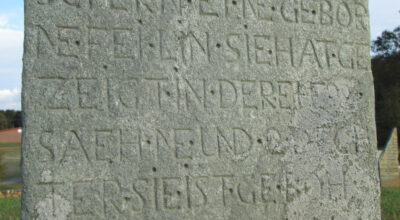Dr. Henry Waiters: The beginning of the apostasy in the church, Part 2
Published 12:00 am Saturday, October 13, 2018
Continued from last week
After Christ’s ascension, some disciples thought it appropriate to honor him by assembling on the first day (Sunday), the day that he showed himself after his resurrection. Some did and some did not.
William Prynne says, “It is certain that Christ himself, his apostles and the primitive Christians for some good space of time did constantly observe the seventh-say Sabbath” — “Dissertation on the Lord’s Day Sabbath,” p. 33.
Morer, clergyman of the Church of England, says “The primitive Christians had a great veneration for the Sabbath, and spent the day in devotion and sermons.” — Morer’s “Dialogues on the Lord’s Day,” p. 189.
Neander the historian notes, “Opposition to Judaism introduced the particular festival of Sunday very early into the place of the Sabbath. The festival of Sunday, like all other festivals, was always only a human ordinance, and it was far from the intentions of the Apostles to establish a divine command in this respect, far from them, and from the early Apostolic Church, to transfer the laws of the Sabbath to Sunday.
But at the end of the second century, a false application of this kind had begun to take place; for men appear by that time to have considered laboring on Sunday a sin.” — Neander’s “Church History,” Roses’ translation — p. 186.
According to Dr. Lyman Abbot, “The current notion that Christ and his apostles authoritatively substituted the first day of the week for the seventh is absolutely without any authority in the New Testament.” — “Christian Union,” June 26, 1890.
Farrar remarks, “The Christian Church made no formal, but a gradual and almost unconscious transference, of the one day to the other.” — “The Voice from Sinai,” p. 167.
“The first effort of the Roman Church to recognize Sunday was in 196 A.D. when Bishop Victor of Rome attempted to impose on all the churches the Roman custom of having the Passover, or Easter, celebrated every year on Sunday.” — Bower’s “History of the Popes,” vol. 1, pp. 18-19, styles “the first essay of papal usurpation.”
“One of the principal reasons for convoking the Council of Nice was to decide the questions relating to the observance of Easter; Easter day was fixed on the Sunday immediately following the full moon which was nearest after the vernal Equinox.” — Boyle’s “Historic View of the Council of Nice,” pp. 23-24, edition 1836.
Constantine urged the observance of this decree of the churches saying, “Let us have nothing in common with the most hostile rabble of the Jews” — Ibid., p. 53. He also issued an edict requiring the judges and the town people and the occupation of all trades “ to rest on the venerable day of the Sun.” — Encyclopedia Britannica article “Sunday,” p. 443.
To be continued
Dr. Waiters can be reached at 704-636-3369.



